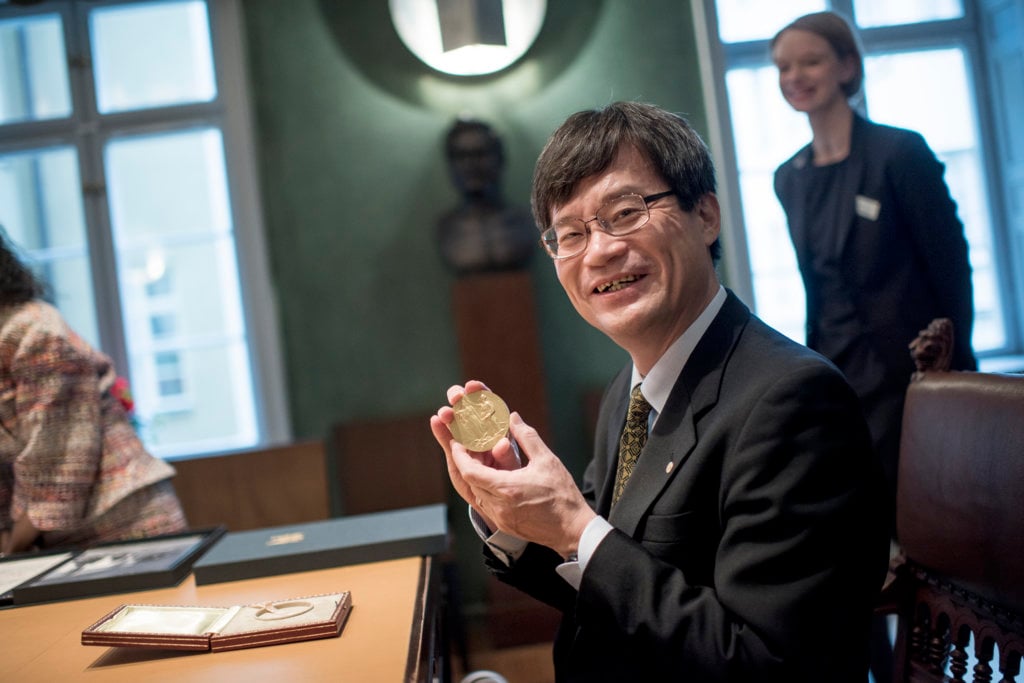On 1 March, 2015, the first Nobel Prize Dialogue outside Sweden will be held in Tokyo. This whole-day conference brings together a truly unique panel of seven Nobel Laureates, world-leading scientists, policy makers and thought leaders, moving science and society closer together. Nobel Prize Dialogue Tokyo 2015 is organised in collaboration between Nobel Media and the Japan Society for the Promotion of Science (JSPS).
Nobel Prize Dialogue is a free to attend whole-day conference filled with lectures and panels discussing a topic of global concern from various angles such as scientific, societal, economic and ethical. Nobel Prize Dialogue is inspired by Nobel Week Dialogue, which has been taking place in Sweden since 2012 on the day before the Nobel Prize Ceremony. Held outside Sweden for the first time, Nobel Prize Dialogue Tokyo 2015, with the topic “The Genetic Revolution and its Future Impact”, is a high-level celebration of the power of ideas.
Nobel Prize Dialogue will have the honourable attendance of Their Majesties Emperor and Empress of Japan at the dinner reception after the conference. The Majesties will meet the Nobel Laureates as well as Lars Heikensten, Executive Director of the Nobel Foundation and Yuichiro Anzai President of JSPS.
Seven Distinguished Nobel Laureates Participating
Among the panellists engaged in the conference are seven Nobel Laureates, including Japanese Laureates Hiroshi Amano,2014 Physics, Koichi Tanaka, 2002 Chemistry, and Shinya Yamanaka, 2012 Physiology or Medicine. Also participating are Nobel Laureates Andrew Fire, Physiology or Medicine 2006, Tim Hunt, Physiology or Medicine 2001, Richard Roberts, Physiology or Medicine 1993, and Kurt Wüthrich, Chemistry 2002. Other panellists include world-leading scientists, policy makers and thought leaders, such as Helga Novotny,Professor emerita of Social Studies of Science at ETH Zurich, Professor Tikki Pang, Director of Research Policy & Cooperation at World Health Organization (WHO) 1999-2012 and Professor Clara Gaff who leads the Melbourne Genomics Health Alliance program, just to mention a few.
– We are thrilled to have so many distinguished speakers and expect a day full of memorable discussions, says Lars Heikensten, Executive Director of the Nobel Foundation.An important part of our mission is spreading knowledge about Nobel Prize-awarded achievements and stimulatinginterest in science. By bringing together these great minds from both science and society, we hope to inspire all participants, especially students and young researchers.
The Genetic Revolution and its Future Impact
What are the consequences of the Genetic Revolution? Will the human body ever by synthetic? Is it wrong to patent genes? These are just a few of the questions the day will address.
The topic for the conference is “The Genetic Revolution and its Future Impact”. In recent years, our knowledge of genetics, genomics and their potential applications has rapidly expanded. How are these developments changing society now and in the future? Talks and panel discussions will tackle pertinent issues ranging from personalised medicine to human evolution. Throughout the day, participants will ask questions, in the venue and online, engaging in a dialogue that will continue even after the conference has closed for the day. The dialogue can be followed via webcast from all corners of the world onwww.nobelprizedialogue.org/tokyo2015.
How are we influencing human evolution?
Were Darwin Alive Today … Would he write the Same Book? This is the title of Juan Enriquez lecture. Juan is the Managing Director of Excel Venture Management in Boston. He is a charismatic and engaging speaker who is known for being a broad thinker and “futurist” who studies the intersection of science, business and society. Exploring the evolution of species over time from a genomics standpoint, Juan will no doubt stimulate new thoughts with his lecture.
Can genetic modification help feed the world?
While genetic modification is not essential to feed the world, it does provide significant advantages, enabling scientists to introduce or enhance traits – virus resistance in cassava, for example, or improved digestibility of feed – that cannot be realized with conventional breeding. Louise O Fresno, University Professor at the Wageningen University in the Netherlands, is a powerful thinker and globe-trotting advisor on sustainability. In her lecture “Genetics, the last frontier in agriculture and food” she gives her take on whether genetics and genomics can help feed the world.
Website: www.nobelprizedialogue.org/tokyo2015
Date: 1 March, 2015
Venue: Tokyo International Forum (capacity: 1 000 persons)
Theme: Genetic Revolution and its Future Impact
Language: English (Japanese simultaneous interpretation provided)
Entrance fee: Free to attend
Organisers: Nobel Media AB and Japan Society for the Promotion of Science
Partners: Saab, Sandvik, Scania and Volvo
Supporting Organisations in Japan: Ministry of Education, Culture, Sports, Science and Technology, Ministry of Foreign Affairs, Yomiuri Shimbun and other partners.
